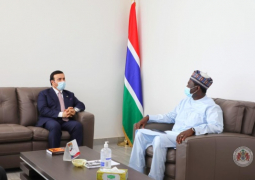
Barry, whose firm was tasked with overseeing the receivership of former Jammeh-era assets, stunned lawmakers when he confessed that the transactions surrounding the “Kaba, Bhutan” stockpile of machinery and vehicles were handled in what he himself described as peculiar and unusual ways.
Pressed by the Counsel, Barry admitted: “I cannot recall getting a formal approval on these items. I haven’t seen anything showing me that I received approval for sale in writing. It may have been a phone call, but I cannot say for certain.”
He added: “We didn’t go to the step of identifying the identities of buyers. If a person pays, that’s what matters. Sometimes a cashier or someone else would just make the payment on behalf of the buyer; we never insisted on verifying,” he explained.
He read out a long list of assets; Mitsubishi pickups, compressors, concrete cutters, excavators, cranes, cement mixers, and even scrap vehicles—most of them rusting away in Kaba, Bhutan. Many were old, some dating back to the 1970s, with repeated entries, inputting errors, and missing details.
When asked whether pictures were taken to confirm the condition of the items at the time of valuation, Barry hesitated before, saying he wasn’t sure but later confirmed that photos did exist.
Barry revealed that in some cases, there was only one buyer identified as Mr. Cham who purchased large swathes of the equipment in bulk. Instead of issuing individual receipts per asset, Barry’s team issued one inclusive receipt for everything.
“There’s a discrepancy between the value and the amount,” Barry admitted. “So it was a global amount of what was received.”
All payments, Barry testified, were deposited into an Ecobank account under the receivership. Some funds were later transferred to the Central Bank, though not always immediately. Operational costs, he said, were deducted from the same account, not necessarily linked to the specific sales that generated the funds.
Barry admitted: “It was the first asset that we were handling. It was something not part of the list considered by the taskforce. So you can say it was a very peculiar transaction.”
But Counsel reminded him that “peculiar” could also mean improper.
Read Other Articles In Headlines

Foreign minister echoes Gambia’s support to UAE’s bid for Interpol presidency
Jul 26, 2021, 12:24 PM




